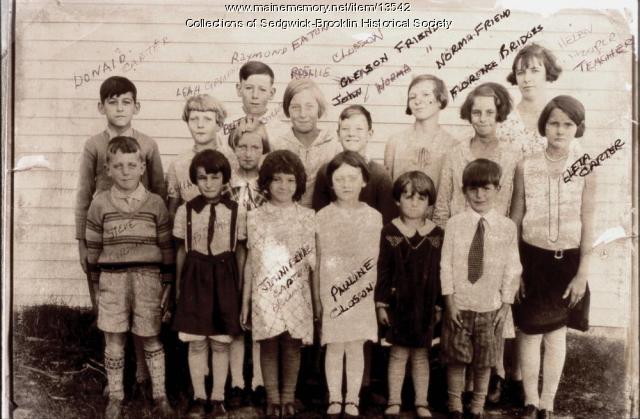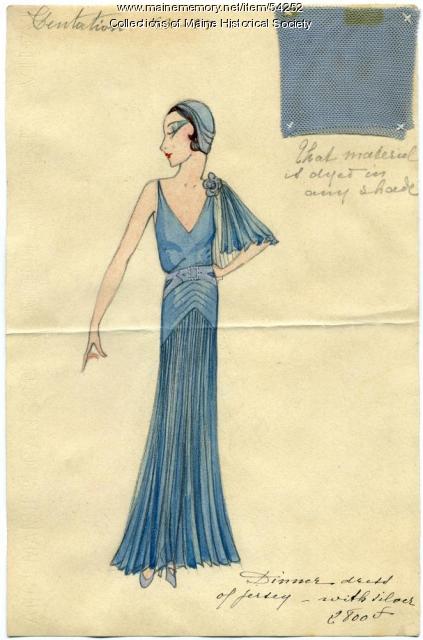Keywords: falls
- Historical Items (783)
- Tax Records (23)
- Architecture & Landscape (50)
- Online Exhibits (99)
- Site Pages (178)
- My Maine Stories (38)
- Lesson Plans (0)
Online Exhibits
Your results include these online exhibits. You also can view all of the site's exhibits, view a timeline of selected events in Maine History, and learn how to create your own exhibit. See featured exhibits or create your own exhibit
Exhibit
Lt. Charles A. Garcelon, 16th Maine
The son of Maine's surgeon general and nephew of a captain in the 16th Maine, Charles A. Garcelon of Lewiston served in Co. I of the 16th Maine. His letters home in the first 17 months of his service express his reflections on war and his place in it.
Exhibit
Reading, Writing and 'Rithmetic: Brooklin Schools
When Brooklin, located on the Blue Hill Peninsula, was incorporated in 1849, there were ten school districts and nine one-room school houses. As the years went by, population changes affected the location and number of schools in the area. State requirements began to determine ways that student's education would be handled. Regardless, education of the Brooklin students always remained a high priority for the town.
Exhibit
Before the era of recorded music and radio, nearly every community had a band that played at parades and other civic events. Fire departments had bands, military units had bands, theaters had bands. Band music was everywhere.
Exhibit
World Alpine Ski Racing in Maine
Sugarloaf -- a small ski area by European standards -- entered ski racing history in 1971 by hosting an event that was part of the World Cup Alpine Ski Championships. The "Tall Timber Classic," as the event was known, had a decidedly Maine flavor.
Exhibit
Remembering Mellie Dunham: Snowshoe Maker and Fiddler
Alanson Mellen "Mellie" Dunham and his wife Emma "Gram" Dunham were well-known musicians throughout Maine and the nation in the early decades of the 20th century. Mellie Dunham also received fame as a snowshoe maker.
Exhibit
Imagery on letterhead soldiers used, on soldiers' memorials produced after the war, and on many other items captured the themes of the American Civil War: union, liberty, and freedom.
Exhibit
Young men and women in the 19th century often went away from home -- sometimes for a few months, sometimes for longer periods -- to attend academies, seminaries, or schools run by individuals. While there, they wrote letters home, reporting on boarding arrangements and coursework undertaken, and inquired about the family at home.
Exhibit
In 1921, Guy Gannett purchased two competing Portland newspapers, merging them under the Portland Press Herald title. He followed in 1925 with the purchase the Portland Evening Express, which allowed him to combine two passions: photography and aviation.
Exhibit
The National Federation of Business and Professional Women's Clubs (NFBPWC) held their seventh annual convention in Portland during July 12 to July 18, 1925. Over 2,000 working women from around the country visited the city.
Exhibit
Cosmopolitan stylings of Mildred and Madeleine Burrage
Born in Portland, sisters Mildred Giddings Burrage (1890-1983) and Madeleine Burrage (1891-1976) were renowned artists and world travelers. Mildred's experiences studying painting in Paris and Italy, and the sisters' trips to Mexico and Guatemala inspired their artwork and shared passions for cosmopolitan and stylish attire. Housed at Maine Historical Society, The Burrage Papers include selections of original advertising drawings called "line sheets" from Parisian fashion houses dating from 1928 to 1936. Images of Madeleine's gemstone jewelry and Mildred's artwork accompany intimate family photographs of the sisters.
Exhibit
At the heyday of trolleys in Maine, many of the trolley companies developed recreational facilities along or at the end of trolley lines as one further way to encourage ridership. The parks often had walking paths, dance pavilions, and various other entertainments. Cutting-edge technology came together with a thirst for adventure and forever changed social dynamics in the process.
Exhibit
Maine Streets: The Postcard View
Photographers from the Eastern Illustrating and Publishing Co. of Belfast traveled throughout the state, especially in small communities, taking images for postcards. Many of these images, taken in the first three decades of the twentieth century, capture Main Streets on the brink of modernity.
Exhibit
2009 marked the bicentennials of the births of Abraham Lincoln and his first vice president, Hannibal Hamlin of Maine. To observe the anniversary, Paris Hill, where Hamlin was born and raised, honored the native statesman and recalled both his early life in the community and the mark he made on Maine and the nation.
Exhibit
Bookplates Honor Annie Louise Cary
A summer resident of Wayne collected more than 3,000 bookplates to honor Maine native and noted opera singer Annie Louise Cary and to support the Cary Memorial Library.
Exhibit
Westbrook Seminary: Educating Women
Westbrook Seminary, built on Stevens Plain in 1831, was founded to educate young men and young women. Seminaries traditionally were a form of advanced secondary education. Westbrook Seminary served an important function in admitting women students, for whom education was less available in the early and mid nineteenth century.
Exhibit
John P. Sheahan, 1st Maine Cavalry, 31st Maine Infantry
John P. Sheahan of Dennysville served in the 1st Maine Cavalry from August 1862 until March 1864 when he was commissioned as a lieutenant in Co. E of the 31st Maine Infantry. His letters reveal much about the life of a soldier, including political views and thoughts about the war.
Exhibit
We Used to be "Normal": A History of F.S.N.S.
Farmington's Normal School -- a teacher-training facility -- opened in 1863 and, over the decades, offered academic programs that included such unique features as domestic and child-care training, and extra-curricular activities from athletics to music and theater.
Exhibit
The Sanitary Commission: Meeting Needs of Soldiers, Families
The Sanitary Commission, formed soon after the Civil War began in the spring of 1861, dealt with the health, relief needs, and morale of soldiers and their families. The Maine Agency helped families and soldiers with everything from furloughs to getting new socks.
Exhibit
Blueberries to Potatoes: Farming in Maine
Not part of the American "farm belt," Maine nonetheless has been known over the years for a few agricultural items, especially blueberries, sweet corn, potatoes, apples, chickens and dairy products.
Exhibit
A Brief History of Colby College
Colby originated in 1813 as Maine Literary and Theological Institution and is now a small private liberal arts college of about 1,800 students. A timeline of the history and development of Colby College from 1813 until the present.
Exhibit
From French Canadians to Franco-Americans
French Canadians who emigrated to the Lewiston-Auburn area faced discrimination as children and adults -- such as living in "Little Canada" tenements and being ridiculed for speaking French -- but also adapted to their new lives and sustained many cultural traditions.
Exhibit
An enduring element of summer camps is the songs campers sing around the campfire, at meals, and on many other occasions. Some regale the camp experience and others spur the camp's athletes on to victory.
Exhibit
Harry Lyon: An Old Sea Dog Takes to the Air
Through a chance meeting, Harry Lyon of Paris Hill became the navigator on the 1928 flight of the Southern Cross, the first trans-Pacific flight. His skill as a navigator, despite his lack of experience, was a key factor on the flight's success.
Exhibit
After the canoe, steamboats became the favored method of transportation on Moosehead Lake. They revolutionized movement of logs and helped promote tourism in the region.
























